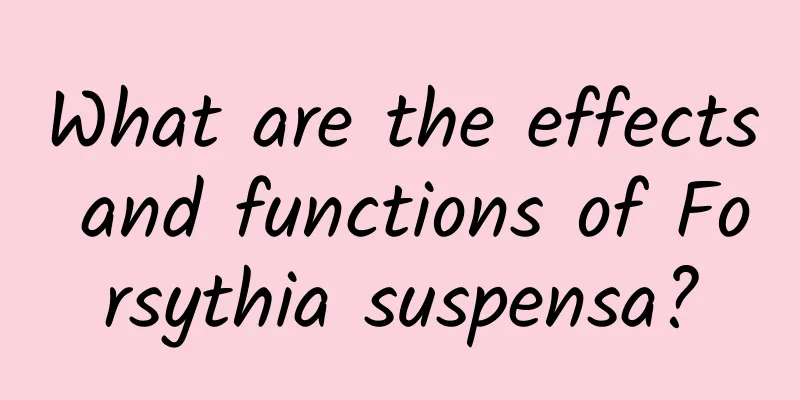What are the effects and functions of Forsythia suspensa?

|
We may have often heard of the Chinese medicine Forsythia suspensa, because we often see it in common cold medicines. Some of the Chinese patent medicines for colds that people usually take must contain Forsythia suspensa. First of all, the reason why Forsythia suspensa is often used is because it has a very good effect of relieving cough and phlegm, relieving nausea and vomiting, and it is very beneficial for jaundice, fever, and reducing gastric mucosal irritation, so this medicinal material has a great effect. Antipyretic and anti-inflammatory It can significantly antagonize endotoxin-induced fever in rabbits, and can significantly inhibit exudation and edema caused by hyperpermeability of capillaries in the early stages of inflammation. Forsythia suspensa decoction or compound Forsythia suspensa injection has a cooling effect on the body temperature of artificially fevered animals and normal animals. Antibacterial, antiviral, detoxification It has significant broad-spectrum antibacterial effect, and its antibacterial components are forsythia phenol, forsythiaside A and volatile oil. Forsythiaside B has antifungal effects. Its volatile oil has a significant inhibitory effect on influenza virus. It also has anti-endotoxin effects. Liver protection and antiemetic It has a significant liver-protecting effect, can reduce liver cell degeneration and necrosis, significantly reduce transaminase, and can promote the restoration of liver glycogen and ribonucleic acid content to normal. Forsythia suspensa has a significant antiemetic effect, and its mechanism is to inhibit the emetic receptor area in the medulla oblongata. Forsythia has an antiemetic effect in pharmacological experiments, but it is rarely used clinically for gastrointestinal diseases because it contains a large amount of saponins, which can irritate the gastric mucosa and cause nausea. Is it an antiemetic or a nausea suppressant? When treating fever, jaundice and other diseases, people without gastrointestinal diseases generally do not respond to doses below 15 to 30 g. For patients with chronic gastritis, a slightly higher dose may cause nausea. This is consistent with the theory in Traditional Chinese Medicine that bitter and cold foods damage the spleen and stomach. This may be the reason why it has traditionally been rarely used in the treatment of chronic gastrointestinal diseases. Regulate blood pressure It has a significant antihypertensive effect on hypertensive animals. It also has a significant pressor effect on hypotensive animals. It can dilate blood vessels, maintain vascular tension, increase cardiac output, improve microcirculation and blood perfusion, and thus stabilize blood pressure. |
<<: What are the effects, functions and consumption methods of Astragalus powder?
>>: What are the functions and effects of mulberry silkworm cocoons?
Recommend
Hypersonic weapons, the US Navy has only tested them nine times in the past five years, and will be deployed in 2028
The U.S. Navy remains on track to deploy hyperson...
The efficacy and function of Mudong
Speaking of Mudong, we are all familiar with it. ...
The efficacy and function of Sanzhibiao [picture]
For Chinese medicinal materials such as Sanzhibia...
Can hand sanitizer replace hand washing? 6 hand washing misunderstandings, how many of them have you encountered?
Hands are the part of the body that most often to...
From what China can provide to what you want, behind China's confidence is its unquestionable strength!
Burning ice to pursue dreams for the Winter Olymp...
Eel fish paste effect and function
Friends who don’t know eel fish paste will not un...
Interesting Talk about AI: A Bottle of Wine "Assists" the Wandering of the Earth
1. Let’s start from watching “The Wandering Earth...
8D Magic Chongqing: Our reputation as the “City of Bridges” is well deserved!
Chongqing, as one of the top ten popular tourist ...
Why can't you remember things before the age of three? Scientists explain
Have you ever had this experience? At a family ga...
Does American ginseng contain estrogen?
As a medicinal material, American ginseng only pl...
How to keep vegetables fresh when stocking up at home?
Mixed Knowledge Specially designed to cure confus...
What are the medicinal properties of Chinese medicine Angelica sinensis?
Speaking of Angelica, everyone knows that it is a...
The efficacy and function of Paulownia
Traditional Chinese medicine is very effective in...









